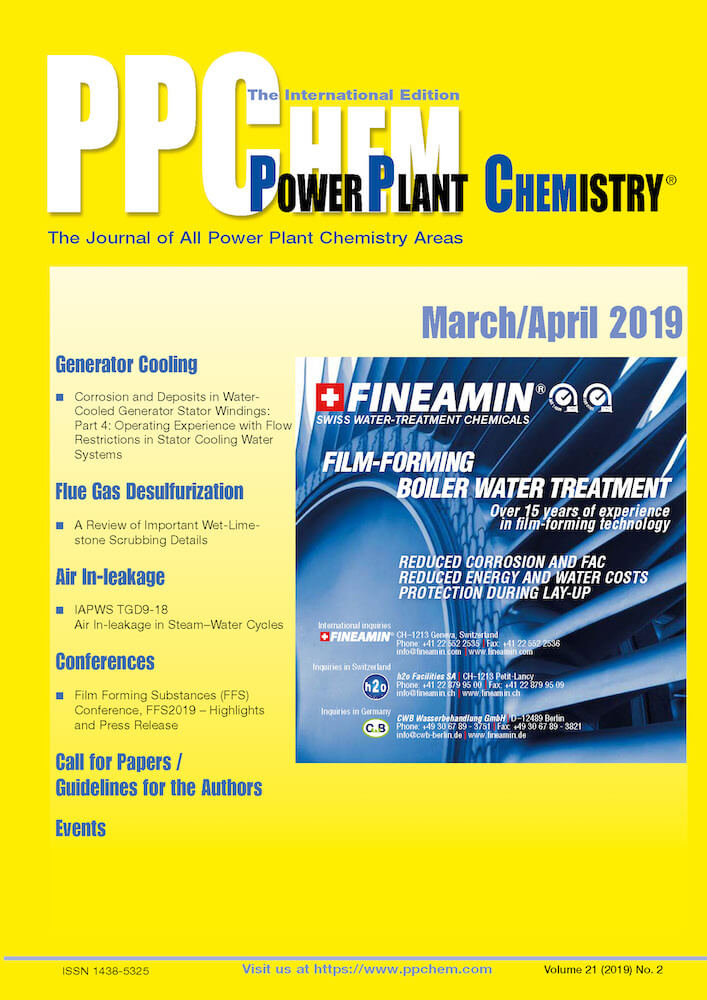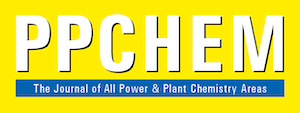
For members only
ABSTRACTS
Corrosion and Deposits in Water-Cooled Generator Stator Windings: Part 4: Operating Experience with Flow Restrictions in Stator Cooling Water Systems
Matthias Svoboda and Thomas Bauer
A common problem with water-cooled generator stator windings is plugging of the hollow conductors that act as cooling channels. The causes are sometimes difficult to identify, but some common factors can be found. Insufficient layup during outages is a common one. The importance of good monitoring and maintenance practices is highlighted throughout the discussed examples.
The stator is the main concern, because of its vulnerability to oxide deposits in the hollow conductors and the fact that if it fails, the whole power plant has to be shut down. Strainers and filters can also plug up and act as early warning devices for stator plugging. If replacing them is not an option, chemical cleaning can help, but it usually only removes the symptoms.
Proactive treatment of these problems should be a priority, as damages can go into the millions. Even when cleaning is still possible, persistent deposits can often only be removed by more invasive treatments.
PowerPlant Chemistry 2019, 21(2), 62–72
For Members only
A Review of Important Wet-Limestone Scrubbing Details
Brad Buecker
Coal combustion releases a number of harmful compounds that need to be removed from the flue gas before discharge to the atmosphere. One of these compounds is sulfur dioxide (SO2). The most common process to remove SO2 is wet-limestone flue gas desulfurization (WFGD). This article examines the fundamentals of this process and discusses modern developments to maximize scrubbing efficiency in these systems.
PowerPlant Chemistry 2019, 21(2), 78–83
For Members only
IAPWS TGD9-18; Air In-leakage in Steam–Water Cycles
The International Association for the Properties of Water and Steam
This Technical Guidance Document considers the phenomenon of air in-leakage (AIL) in fossil, combined cycle / HRSG, and biomass plants. It covers the importance of AIL to the performance and cycle chemistry control of generating plants. The sources of AIL are delineated as well as the background science. The monitoring equipment/techniques are provided in Section 4. Controlling guidance for AIL in the most common generating plants worldwide is covered in Section 6, as well the customization aspects for other plants with varying equipment in Section 7. The document represents the accumulated experience of the IAPWS Power Cycle Chemistry (PCC) Working Group with representation from 24 countries.
PowerPlant Chemistry 2019, 21(2), 90–127
Film Forming Substances (FFS) Conference, FFS2019 – Highlights and Press Release
The third FFS International Conference was held on the 19th – 21st March 2019 in Heidelberg, Germany chaired by Barry Dooley of Structural Integrity. FFS2019 was a unique conference on a narrow topic in cycle chemistry control of power plants but attracted over 70 participants from 22 countries.
PowerPlant Chemistry 2019, 21(2), 130–131


